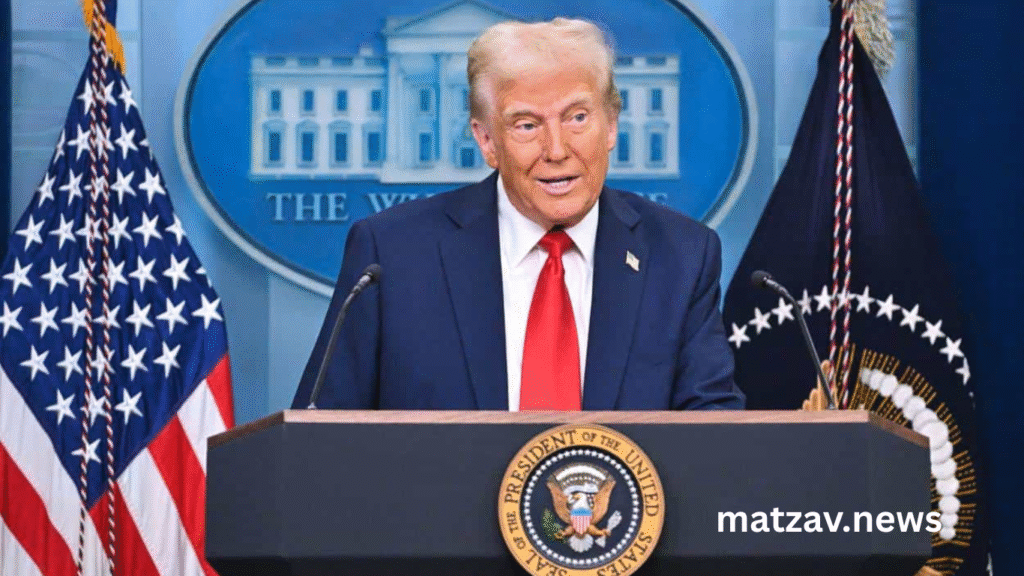A new tax bill making its way through Congress could give former President Donald Trump a powerful tool to retaliate against countries that impose digital services taxes on U.S. tech giants. With the 2024 election looming and Trump signaling a hardline stance on international trade, this provision is raising eyebrows. Lawmakers have included a clause that allows the president to impose steep penalties described by critics as a “sledgehammer” on nations targeting American digital companies like Google, Amazon, and Meta.
The move is being seen as both a defense of U.S. tech interests and a potential flashpoint in global tax diplomacy. Supporters argue it levels the playing field for American firms facing what they consider unfair treatment abroad. Critics, however, warn it could spark trade wars and strain alliances. As Trump positions himself as brutal on foreign governments, this tax bill could become a cornerstone of his economic agenda if he returns to the White House.
Understanding the New Tax Bill and Its Implications
Key Provisions in the Tax Legislation
The new bill allows the president to impose retaliatory measures on foreign nations that enforce digital services taxes (DSTs) discriminating against U.S. firms. It includes:
- Authorization to levy tariffs on affected countries
- Mechanisms to review and counter foreign tax laws targeting digital services
- Expanded investigative powers for the U.S. Trade Representative (USTR)
These provisions align with broader protectionist strategies and aim to pressure countries to abandon unilateral digital tax regimes in favor of multilateral solutions.
Why Digital Services Taxes Became a Flashpoint
Countries like France, the UK, India, and Italy have enacted DSTs, arguing that tech giants earn substantial revenue without paying their fair share of taxes locally. These measures usually apply a percentage fee to revenues generated from digital advertising and user data within national borders.
U.S. officials see these taxes as unfair trade barriers. The tax bill grants future presidents the power to label specific discriminatory provisions and retaliate accordingly, with Trump likely to utilize this authority more aggressively than his predecessors.
The Global Context of Digital Taxation

European Digital Tax Policies Under Scrutiny
The European Union has long been pushing for a unified digital tax policy. France implemented a 3% digital services tax (DST) on major tech companies, prompting threats of U.S. tariffs in return. While the OECD has sought a global agreement, implementation delays have led some nations to continue their daylight-saving time (DST) practices.
Trump, known for his tough stance on trade, could use the new law to reintroduce tariffs on European goods in retaliation, reigniting transatlantic tensions.
The OECD’s Role in Seeking Tax Harmony
The Organisation for Economic Cooperation and Development (OECD) has led negotiations toward a global digital tax framework. The 2021 agreement aimed to reallocate taxing rights and implement a minimum corporate tax rate. However, the rollout has stalled.
Read More: Trump calls Putin ‘crazy’ after Russian attack on Ukraine
Trump’s potential return, armed with this new law, could disrupt ongoing talks and lead to an increase in bilateral disputes rather than a global consensus.
Trump’s Trade Playbook and Potential Moves
Historical Precedents from Trump’s First Term
During his first term, Trump regularly imposed tariffs to rebalance trade relationships. He challenged China with sweeping import taxes and threatened similar action against allies over auto and agricultural goods. The new tax bill fits within this strategic pattern.
Trump may use the new DST retaliation powers to pressure countries into eliminating their digital taxes or risk facing economic consequences.
Potential Target Countries and Trade Impacts
Countries with active DSTs include:
- France
- United Kingdom
- India
- Italy
- Turkey
- Spain
A Trump administration could impose tariffs on imports from these countries, disrupting supply chains and increasing costs for U.S. businesses and consumers.
Legal and Diplomatic Ramifications
Compliance with International Trade Laws
Retaliatory tariffs risk violating World Trade Organization (WTO) rules, especially if deemed disproportionate or politically motivated. If Trump exercises the new powers without exhausting dispute resolution mechanisms, affected nations may escalate the matter through WTO challenges or counter-retaliation.
Legal experts warn that aggressive action could erode the U.S.’s standing in global trade governance.
Effects on U.S. Diplomacy and Tech Policy
Using the bill’s provisions aggressively could alienate allies and undermine cooperation on broader tech regulations, privacy frameworks, and cyber policies. The move signals a shift from diplomacy to economic coercion in digital tax negotiations.
Diplomats worry that this could isolate the U.S. at a time when global cooperation is crucial for regulating Big Tech and combating online misinformation.
Economic Implications for the Tech Industry

Boosting U.S. Tech Firms’ Competitive Edge
Retaliatory power may shield American companies from foreign tax burdens, reinforcing their market dominance. By deterring countries from enacting DSTs, U.S. tech firms may enjoy more favorable tax environments abroad.
However, some critics argue this gives U.S. firms an unfair advantage and fails to address concerns over tax avoidance.
Risk of Escalating Global Trade Conflicts
The risk of tit-for-tat tariffs looms large. Industries unrelated to digital services, like agriculture, wine, automotive, and fashion, could face unintended consequences. In previous trade disputes, Europe retaliated with tariffs on Harley-Davidsons and bourbon.
This economic ripple effect could inflame domestic opposition and strain international alliances.
Reactions from U.S. Lawmakers and Global Leaders
Bipartisan Support with Divided Motives
While the bill passed with bipartisan support, Democrats and Republicans backed it for different reasons. Republicans emphasize protection for American companies, while some Democrats view it as a means to leverage countries toward OECD compliance.
Trump allies hail the measure as a long-overdue step to reclaim digital trade fairness.
Pushback from International Leaders
French and EU officials have criticized the bill, calling it a “provocation” and a “step backward” for multilateralism. India has defended its digital tax as a necessary tool for a digital economy.
Global leaders fear this could collapse years of cooperation and reignite economic nationalism.
Future of Digital Taxation Under Trump’s Shadow
A Shift Away from Global Tax Consensus
If Trump uses this bill’s powers aggressively, it could derail efforts at global tax cooperation. The OECD framework, already fragile, may lose credibility if key players opt for unilateral actions over multilateral agreements.
Countries may also seek alternative alliances that exclude the U.S., weakening its influence on global economic policy.
Preparing for a New Digital Trade Landscape
Businesses, especially multinational tech firms, must prepare for uncertainty. The potential for retaliatory tariffs, regulatory fragmentation, and inconsistent tax regimes could disrupt strategic planning and investment.
Investors may also grow cautious as regulatory risks rise across key markets.

Frequently Asked Questions
What is the new tax bill passed by Congress about?
It grants the U.S. president the authority to impose retaliatory measures on countries that impose digital taxes targeting American tech companies.
Why are digital services taxes controversial?
They primarily target U.S. firms, such as Google and Amazon, which many view as unfair trade practices against American digital exports.
Which countries currently have digital taxes?
Countries including France, the UK, India, Italy, Spain, and Turkey have implemented digital services taxes.
How could Trump use this new authority if re-elected?
Trump may impose tariffs or trade restrictions on countries with digital services taxes (DSTs), pressuring them to abandon their digital tax regimes.
What role does the OECD play in digital tax policy?
The OECD aims to create a global tax framework to prevent unilateral digital taxes and ensure fair tax distribution among nations.
How might this bill affect U.S. relations with allies?
It could strain diplomatic ties, especially with European nations, and challenge multilateral cooperation on tech and tax issues.
Are these retaliatory measures legal under international law?
Their legality under WTO rules is debatable, especially if viewed as disproportionate or politically driven without recourse to dispute resolution.
What is the economic impact on American tech companies?
They could benefit from reduced foreign tax burdens but also face risks of global instability and trade conflicts.
Could this bill lead to a trade war?
Yes, aggressive enforcement might trigger retaliatory tariffs from affected nations, leading to broader economic conflict.
Is this bill unique to Trump?
While not exclusive to Trump, his administration would likely use its provisions more aggressively than others.
Conclusion
The new tax bill marks a pivotal shift in U.S. trade policy, empowering future presidents, especially Trump, if re-elected, to counter foreign digital taxes. While it may benefit U.S. tech firms in the short term, it risks igniting global trade disputes, undermining diplomatic ties, and stalling international cooperation on digital taxation.
